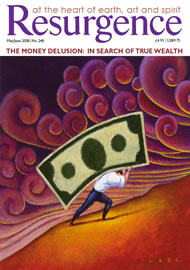This week I was invited to speak in Chagford which is a beautiful town near Dartmoor in Devon. There were about 200 people in the audience and Nicky Scott introduced me. Nicky is a great compost builder as well as a great community builder, I could feel a strong sense of community in the hall. In my talk I spoke about the importance of building community resilience because we need to have strength and resilience in our communities to withstand any unexpected problems which may arise from time to time.
The great challenges we face today: challenges of global warming; global poverty; peak oil; and global terrorism; will not be met adequately unless communities get together and plan transformation and transition based on the inner resources and resilience of the community itself. People in Chagford already seem to be aware of this challenge.
In the Chinese language the word for ‘crisis’ and ‘opportunity’ is the same. So, the crises of global warming, peak oil etc are also opportunities to redesign our economic system, our energy consumption, and other systems of producing goods and services. Rather than blaming and complaining, or getting depressed at the prospect of doom and gloom, building community resilience and designing sustainable systems could be and should be a creative opportunity. The fossil fuel dependent systems we have today are not god-given, they are designed by humans, and what is designed by humans can be changed and re-designed by humans.
More and more people at grassroots level are realising this. It was clearly evident in Chagford that global warming and peak oil are not the real problems; they are consequences of our way of life – they are merely the symptoms of the problems. Most of the politicians, industrialists and business leaders are busy treating the symptoms; they are looking for alternative to fossil fuel. They are looking to find answers in bio-fuel or nuclear fuel or even large-scale renewable energy.
However, people at a grassroots level, like in Chagford, are looking at a strategy of transition from wasteful, consumerist culture, to a culture of frugality, simplicity and restraint. This is no ‘hair-shirt, brown rice and sandal brigade’; this transition culture is a move towards creating a way of life which is joyful, creative, imaginative, artistic and healthy.
Frugality and abundance are complementary; they go together in the same way as waste and scarcity go together. The modern culture of waste is the cause of scarcity, leading to global warming and peak oil. Whereas the post-modern culture of frugality and simplicity, the culture of less is more, the culture of quality instead of quantity, will bring abundance. As Mahatma Gandhi said, “There is enough in the world for everybody's need, but not enough for anybody's greed". From this perspective, greed is the cause of global warming and restraint is the solution. We need to move from greed to gracious living with a sense of gratitude and ecological humility.
This culture of transition is spreading throughout England. Not far from Chagford is the town of Totnes which is one of the leading transition towns. There are nearly 60 other towns in England actively engaged in the transition culture. This is the most hopeful development in recent times to emerge from increasing levels of environmental awareness. This transition culture is the greatest source of people’s empowerment. People are able to take initiative within their own communities rather than wait for someone else to solve their problems. We needn’t be depressed or pessimistic, the transition culture is a sign of hope and a way to build community resilience. We can neither do it alone, not wait for our government to do it for us, we must do it as a community. Chagford and Totnes are moving in that direction.







